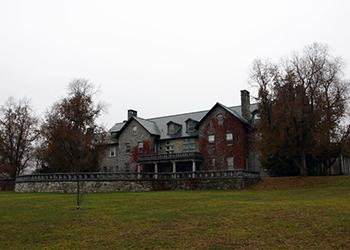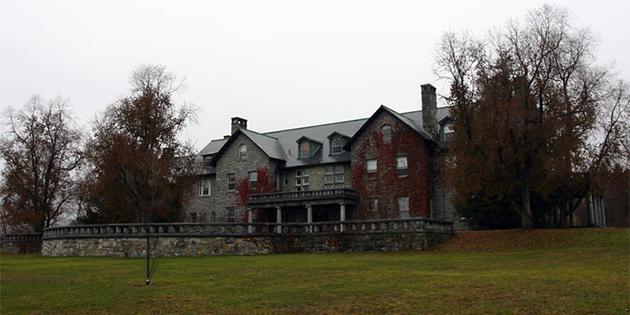
Jennings Hall at Bennington College, by Jared C. Benedict. [CC BY-SA 2.0], via Wikimedia Commons
Bennington College is leading the way in inquiry-based learning, a process based on the belief that the deepest and most meaningful learning stems from and is driven by a student’s individual curiosity. Students design, curate, and build their own education. In this month’s interview, Dr. Isabel Roche shares her thoughts on inquiry-based learning, how it works at Bennington, and its effects on students, faculty, and the community.
Andrew Hibel, HigherEdJobs: Dr. Roche, please briefly explain your professional background and your current role at Bennington College.
Dr. Isabel Roche, Provost and Dean, Bennington College: I have made my entire career in higher education, and have been at Bennington since 2003, first in a faculty position teaching French and French literature, and, since 2010, serving the College in an administrative capacity, as associate dean for academic affairs and then as provost and dean of the college.
As provost, I oversee academic affairs, student affairs, institutional research, the library, graduate and certificate programs, and our Field Work Term and Career Development Office and Center for the Advancement of Public Action. My work, in all its facets, is oriented by Bennington’s animating vision for student self-direction and self-fulfillment and our aim to educate students towards constructive social purposes.
Hibel: Bennington College is unique in its approach of “inquiry-based learning.” Please explain the college’s philosophy towards this goal.
Roche: Bennington was founded in 1932 as a laboratory to explore new approaches in higher education — particularly those based on Dewey’s model of progressive education. Central to the College’s founding vision was the belief that education is most powerful when students themselves define its direction. The College envisioned that students would take with them when they graduated not only what they had learned but also an understanding of how they had learned it — developing a kind of metacognition that has become only more relevant (and I would even say necessary) today.
Each student at Bennington designs an individual inquiry through what we call the “Plan Process.” This process provides a framework that allows students to ask and pursue their own questions — questions that help determine their areas of study — all while achieving the breadth and depth that is a hallmark of a liberal arts education. In consultation with faculty, students design the content, structure, and sequence of their time at Bennington, taking full advantage of curricular and co-curricular opportunities. Their inquiries come to fruition in sophisticated, often interdisciplinary work during their final terms at Bennington.
The whole of the process is based on a belief that the deepest and most meaningful learning happens when it arises from a student’s ever expanding curiosity; learning doesn’t typically flourish within the constraints of pre-determined or imposed paths.
Hibel: As stated on your homepage, Forbes ranks Bennington among the country’s top five most entrepreneurial colleges and also named Bennington one of “tomorrow’s hot colleges.” What separates Bennington from other colleges in order to earn these designations?
Roche: The very nature of a Bennington education demands that students adopt an entrepreneurial mindset in their approach to it: they design, curate, and build their education. They learn how to give form to an idea — and bring it forward. Bennington was also among the first colleges to bring an educational focus to work by integrating work in the classroom with work in the field through a Non-Resident Term, now called Field Work Term, which requires that students go out into the world and work for seven weeks each winter.
We also foreground the capacities that we want students to develop at Bennington and to continue to build throughout their lives — the ability to inquire, research, create, engage, and communicate. These are more than skills — they are the tools students need to be successful in whatever they do. We often say at Bennington that we are educating students not just to enter the world as they find it, but to make the world as they want it to be. Our students are true “change makers.”
Hibel: What attracted you to work at a college that is atypical in that it doesn’t have pre-designated majors or departments and allows students such flexibility?
Roche: I attended a small liberal arts college, and benefited enormously from it. I learned to think and write critically in more sophisticated ways, and was exposed to new and stimulating ideas. But no one pushed me to articulate what my intellectual, artistic, or ethical motivations were — or how my chosen course of study fueled them. We do that at Bennington — and I see the value of it every day among both students and faculty. Because of rigorous and ongoing reflection, students know why they are doing what they are doing. And I find that very compelling.
The other thing that drew me to the Bennington model is the robust commitment to the education of the whole student that Bennington foregrounds. The intellectual being cannot be separated out from the rest, nor should it be. We are committed to students’ development in the round, as well as to the complicated work of building a diverse and inclusive community in all its forms. Indeed, the relationship between individual and social engagement and responsibility — at Bennington and beyond — is woven into all we do.
Hibel: Bennington requires all students to complete a seven-week internship every year. “By the time they graduate, Bennington students have acquired at least four jobs or internship experiences and a deep understanding of what they want to do.” It is impressive that this type of work experience is part of the curriculum. Although Bennington has less than 1,000 students, how does the college manage this process of the internship program for all of the students?
Roche: The Field Work Term and Career Development Office, with five full-time staff members, manages the placement process and helps students as much or as little as they need — whether with support for things like putting together a resume and cover letter or securing housing or simply managing logistics. As learning how to do these things for oneself is part of the value of FWT, student agency and active learning is privileged here, just as in the other elements of a Bennington education.
Hibel: In an inquiry-based learning environment, how are students evaluated to confirm that necessary skills and knowledge needed for the workplace have been obtained?
Roche: Assessment of student learning at Bennington is an ongoing, robust, and multifaceted practice. Students received detailed narrative evaluations for each course they take, with a letter grade in addition, if requested. This substantive feedback informs the Plan Committee’s assessment of the inquiry that a student proposes to undertake. At the same time, we measure through the Plan the ways in which our students, throughout their time at Bennington, progress in the above-mentioned capacities — their ability to inquire, research, create, engage, and communicate. Students’ Field Work Terms are assessed by both employers — who look at the skills needed in the workplace — and the College. And the backbone of the Plan Process is student self-assessment — which allows for the building of the reflective muscle that I described above.
Hibel: Bennington has no tenure-track options, and all faculty are equal in rank. As the provost and dean, what type of advantages and disadvantages do you see in this approach?
Roche: As a small college, which puts students and student learning at the center of everything it does, Bennington is a place where all faculty are engaged to do the same job. The absence of rank and tenure reflect that philosophical orientation.
Bennington faculty are hired on a renewable contract system. Appointments are made on a multi-year basis; a first appointment is typically three years in length and reappointment length is variable, up to 10-year appointments. We ask faculty to be — as described above — teacher-practitioners, who are makers of original work and whose work and teaching are in what we call “fruitful interaction.” As at most colleges and universities, faculty are evaluated on their teaching and advising, quality and quantity of professional work, and service to the College. But of course, different faculty members manifest these qualities differently.
When Bennington adopted this model, in the 1990s, there were skeptics, convinced that the College would not be able to recruit and retain a highly qualified faculty. I couldn’t be more delighted to say that this is not the case. We have an exceptionally strong and qualified faculty — more than half of whom have been at Bennington for 10 years or longer — who have chosen to make their careers at Bennington. Our faculty model reflects the institution’s belief in a shared enterprise in which everyone is equally engaged.
Hibel: When interviewing and considering faculty to work at an institution that is inquiry-driven in its learning approach, what type of candidate fits well and, if hired, how does one succeed?
Roche: Bennington faculty share what I would call a productive restlessness — a curiosity that drives their professional work, teaching, and mentorship.
In any given semester, somewhere between 30 and 50% of the courses in our curriculum are new, born of evolving faculty and student interests, and faculty co-teaching is a regular practice. Bennington is a place where faculty — called “teacher-practitioners”– are encouraged to both pursue what drives them and bring it into the classroom, to expand their established expertise and model what it is to grow intellectually. Faculty have to embrace this exhilarating ride!
Hibel: What keeps you engaged working in academia?
Roche: It is a simple answer — the students. I became a teacher, and then an administrator, because I believe deeply in the power of learning, that learning transforms us and our relationship to everything else. This has certainly been my own experience — and I appreciate most the ways in which my work at Bennington pushes me to examine, reflect, and grow. In higher education, our greatest responsibility is that of creating and maintaining — every day — the conditions for transformative learning.
